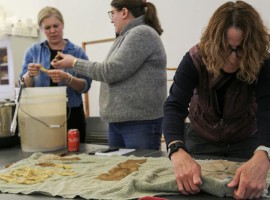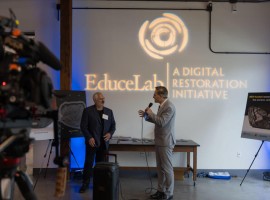New UK Social Work Study Zeros in on Self-Care During COVID-19

It is a profession committed to the well-being of others — social workers provide a broad range of services and help people cope with everyday issues.
But meeting the needs of others day after day, while potentially putting their own needs aside, could lead to burnout. Now, add the stressors that accompany a global pandemic.
To learn more about the impact of COVID-19 on social workers, researchers in the College of Social Work (CoSW) Self-Care Lab at the University of Kentucky conducted an insightful study.
“We focus a lot on the acute medical issues associated with COVID-19, and social workers are definitely doing pertinent work alongside other health care providers in that arena,” College of Social Work Dean Jay Miller, lead investigator of the study, said. “But social workers are also doing work to address other problematic consequences, such as unemployment, growing mental health needs, child protection and access to education. These factors certainly make for stressful practice conditions, which can contribute to professional burnout.”
Burnout, a term first coined by American psychologist Herbert Freudenberger in 1975, describes what happens when a practitioner becomes increasingly inoperative. As symptoms worsen, its effects can turn more serious.
That begs the question, how can social workers provide compassionate care for others if they are not doing the same for themselves?
To better identify self-care issues, the comprehensive study surveyed social work practitioners throughout Kentucky. This is the first-known study to examine the impact of COVID-19 on self-care among social work practitioners.
The study, launched this summer, assessed several aspects of self-care and factors that influence self-care practices among social work practitioners in a wide array of settings.
Researchers found that since COVID-19 was declared a pandemic in early March, self-care practices among social workers have significantly decreased. In fact, over 90% of practitioners reported COVID-19 has negatively affected their ability to engage in adequate self-care.
“Given the importance of self-care to the profession, these findings are extremely concerning,” Brenda Rosen, executive director of the Kentucky chapter of the National Association of Social Workers, said. “This research really illustrates the need to support social workers during this unprecedented time.”
While some of the findings were expected, researchers noted a few surprising results. For instance, analyses revealed that gender, race/ethnicity and sexual orientation are all factors that influence engagement in self-care.
In summary, social workers who identified as female, white or LGBTQ* reported engaging in significantly fewer self-care practices.
Additionally, practitioner’s working remotely reported struggling to engage in adequate self-care practices.
“Though there are certainly commonalities, results from this study show that people are experiencing the pandemic in very different ways,” Miller explained. “Responses and interventions aimed at improving self-care must take these differences into account.”
The CoSW understands managing crippling stress among these practitioner groups is fundamental to their well-being and the well-being of the populations they serve.
Researchers, like Miller, believe self-care is not only indispensable but cannot be ignored. He hopes this study will highlight the need to examine and develop beneficial approaches to support all helping professionals.
“For the foreseeable future we, as a society, will be dealing with the ramifications of COVID-19. Social workers, and other professionals, will be instrumental in the recovery from this pandemic,” Miller said. “Given the importance of these practitioners, it is absolutely imperative that we build a knowledge base that informs how we support them. This study contributes to doing just that.”
To learn more about The Self-Care Lab, you can view this video. If you have additional questions about this project or would like to receive a copy of the full report, email selfcarelab@uky.edu.





